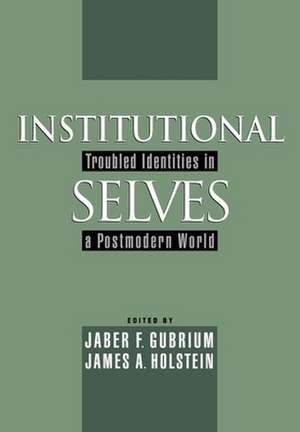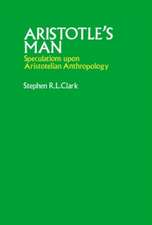Institutional Selves: Troubled Identities in a Postmodern World
Editat de Jaber F. Gubrium, James A. Holsteinen Limba Engleză Paperback – aug 2000
Institutional Selves acknowledges the socially practical self we live by. It brings together nine distinctive chapters that collectively address the institutional construction of troubled identities. From the victims and villains of television talk shows, to battered women in support groups, to the violent selves of prison inmates, this book illustrates how selves are organizationally informed and structured in institutional practice. The institutional construction of selves is an especially interesting issue as social problems, their causes, and their victims are endlessly reinterpreted by the various organizations devoted to helping resolve associated troubles. This book deals with fundamental and complex issues in a well-illustrated, multi-faceted manner. It provides common vocabulary that offers students a consistent language for discussing the construction of troubled identities. The style of the book is accessible and appropriate to a wide range of undergraduate students in sociology. The book neither talks down to the novice nor strains the patience of more experienced researchers. It can be used to lay the foundation for discussion of how the self is constructed in today's world by linking the social psychology of the self to the organizational processing of deviance and social problems.
Preț: 707.77 lei
Preț vechi: 969.56 lei
-27% Nou
Puncte Express: 1062
Preț estimativ în valută:
135.43€ • 141.78$ • 112.06£
135.43€ • 141.78$ • 112.06£
Carte tipărită la comandă
Livrare economică 05-19 aprilie
Preluare comenzi: 021 569.72.76
Specificații
ISBN-13: 9780195129281
ISBN-10: 0195129288
Pagini: 208
Dimensiuni: 154 x 233 x 10 mm
Greutate: 0.3 kg
Editura: OXFORD UNIV PR
Locul publicării:New York, United States
ISBN-10: 0195129288
Pagini: 208
Dimensiuni: 154 x 233 x 10 mm
Greutate: 0.3 kg
Editura: OXFORD UNIV PR
Locul publicării:New York, United States
Descriere
Today, identities are conferred and selves are constructed in more organizational settings than ever before. Institutions large and small - from Psychiatric hospitals, schools, and prisons, to job clinics, counselling centres, support groups - virtually instruct us about who and what we are as part of the work they do in processing lives and personal troubles.Some see this negatively, as if the self might somehow escape these developments. But there is a more balanced view that acknowledges the socially practical self we live by, which is constructed in light of these new and diverse opportunities. If organizations inevitably shape selves in today's world, they do so by providing the resources, not just the constraints, that enter into the process. New institutions produce new forms of self by presenting new options for who and what weare and can be, while they also place practical limits on the range of possible identities. This is the leading theme of Institutional Selves. The book brings together nine distinctive chapters that collectively address the institutional construction of troubled selves. From the victims and villains oftelevision talk shows, to battered women in support groups, to the violent selves of prison inmates, the chapters show how personal identity is structured in response to the pragmatic demands of everyday life in the ubiquitous settings where personal troubles are under increasing consideration.












